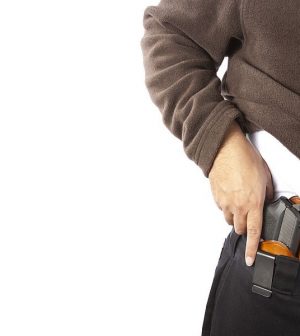- The Best Time of Day to Drink Bone Broth to Maximize Health Benefits
- 8 Ways to Increase Dopamine Naturally
- 7 Best Breads for Maintaining Stable Blood Sugar
- Gelatin vs. Collagen: Which is Best for Skin, Nails, and Joints?
- The Long-Term Effects of Daily Turmeric Supplements on Liver Health
- Could Your Grocery Store Meat Be Causing Recurring UTIs?
- Are You Making This Expensive Thermostat Error This Winter?
- Recognizing the Signs of Hypothyroidism
- 10 Strategies to Overcome Insomnia
- Could Artificial Sweeteners Be Aging the Brain Faster?
Mental Illness Not a Factor in Most Mass Shootings

Contrary to what many believe, a new study finds that mental illness isn’t a factor in most mass shootings or other types of mass murder.
“The findings from this potentially definitive study suggest that emphasis on serious mental illness, such as schizophrenia or psychotic mood disorders, as a risk factor for mass shootings is given undue emphasis, leading to public fear and stigmatization,” study co-leader Gary Brucato said in a Columbia University news release. He’s an associate research scientist in the university’s Department of Psychiatry in New York City.
Brucato and his colleagues analyzed 1,315 mass murders of all types that occurred worldwide and found that only 11% of all mass murderers (including shooters) and only 8% of mass shooters had serious mental illness.
The rate was 18% among people who committed mass murder through non-firearm means such fire, explosives, poison, stabbing, bludgeoning or driving vehicles into crowds.
While guns were used in nearly two-thirds of all mass murders, non-firearm means resulted in significantly more casualties per event.
The researchers also found that mass shooters in the United States were more likely to have legal histories, use recreational drugs, abuse alcohol, and have histories of non-psychotic psychiatric or neurologic symptoms.
Most mass shooters used non-automatic firearms. Among U.S. mass shooters, those with any psychiatric or neurologic condition were more likely to use semi-automatic guns than non-automatic guns.
These findings could help inform how background checks for gun purchases should be conducted, according to the researchers at the Center of Prevention and Evaluation at Columbia University’s Irving Medical Center and the New York State Psychiatric Institute.
They also found that since 1970, the rate of mass shootings has been far higher than the rate of non-firearm mass murder, and that the vast majority of mass shootings have been in the United States.
The study was published online recently in the journal Psychological Medicine.
“These data suggest that other difficulties, such as legal problems, substance and alcohol use, and difficulty coping with life events seem more useful foci for prevention and policy than an emphasis on serious mental illness,” said study co-author Dr. Paul Appelbaum, a Columbia psychiatrist.
More information
The American Public Health Association has more on gun violence.
SOURCE: Columbia University Irving Medical Center, news release, Feb. 18, 2021
Source: HealthDay
Copyright © 2026 HealthDay. All rights reserved.










